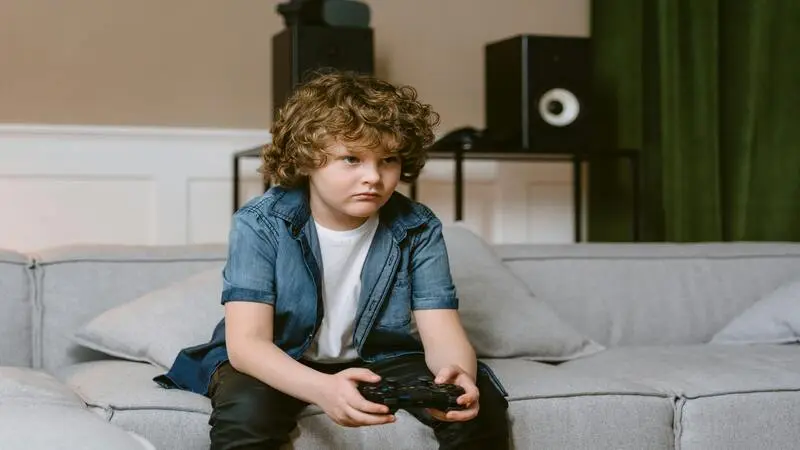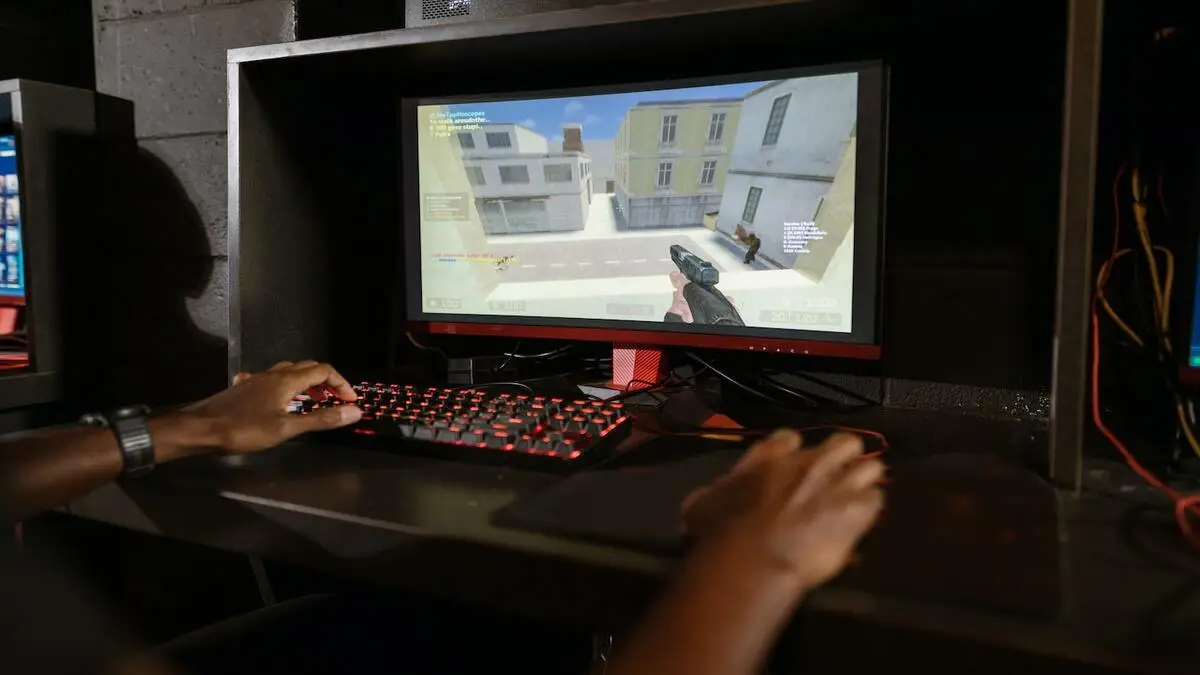The Hidden Impact of Online Gaming on Kids’ Brain, Body & Behavior
The overdoing of anything is always considered harmful, as per the general wisdom, including online gaming, which is not an exception to this rule. The effect of online gaming is taking a toll on everyone, especially on students and young children all over the world. With the advancement of technology and the rise of the standards of living, the procurement of these has become much easier.
Nowadays, children are being bestowed with all sorts of facilities by parents, which is not a bad thing at all. However, what the parents don’t realise is that not everything that they provide to children is essential for the child. The mobile phones, for example, are something which may or may not be required by the kid and depend upon the age of the child. These mobile phones are instrumental in creating an addiction to online gaming in kids in no time.
Effects of online gaming on kids
The World Health Organization (WHO) has officially recognized video gaming addiction as a mental condition and has been put at par with alcohol and drug abuse in one of the versions of the International Statistical Classification of Diseases (ICD).
This, the research said, can co-occur with depression and anxiety (WHO, 2005; Király & Demetrovics, 2017). Also, as per an older report (Leung & Kee, 2017; Barrett et al., 2004), it was mentioned that prolonged online gaming can lead to eyesight problems (due to continuous blue light exposure), obesity problems, disturbance in sleep cycles, a phenomenon of repetitive strain injuries and fatigue.
India, too, is witnessing its share of the online gaming problem in children and some rehabilitation centers have been created or set up as a result of this menace. A Bengaluru-based world-renowned centre of mental health and neurosciences (NIMHANS) and All India Institute of Medical Sciences (AIIMA) are specially designed to treat the condition of mental illnesses that result from online gaming addiction.
The impact of playing these video games continuously is immense on the kids and by the time they are brought to the mental centers, they have already developed behavioural issues, sleep deprivation and surprisingly lack of communication skills, which otherwise were fine.
The respite factor and a ray of hope are generated from the fact that recently, The indian President, Draupdi Murmu, has given her nod for the Promotion and Regulation of Online Gaming Bill, 2025, which aims to regulate online gaming in India. This bill, when passed, will benefit the parents of the kids who are susceptible to the gaming menace that is
Effect of online gaming on students as per research
Quite understandably, the effect of playing online games relentlessly takes a toll on studies, too. By the time the habits of playing these games over a period of time, the condition becomes out of control. The impact is found on the students who are the worst sufferers. It takes a toll on the academic performance, the mental health (memory issues, weakened reflex action, etc.), and the communication skills of the students.
As per the study done by the National Institute of Health (NIH-USA) in 2023 on some 399 students of Bangladeshi origin, the effect of overplaying online games results in multiple complications in students. Of all the 62.7% students who were into online gaming, it was reported that the cumulative grade point average (CGPA) levels were decreased, less physical activity was reported and less time allotted to studies. This happened when the students played the online games for at least 30 hours per week.
Online gaming effects on mental health and behaviour
The effects of online gaming on kids have serious consequences. It has a direct effect on the mental health of the kid and the grown-ups are more susceptible to this danger. The more aged the kid is, the more mature it is and hence the elevated senses.
This prompts the kid to explore more on the net and thus comes into contact with the online gaming world. Once, getting used to it, it starts to give the kid a sense of gratification of achieving something, when the child starts to experience some wins. This is where the trap lies.
It starts a loop in which the child is entangled and the dangerous part is that the child knows about it. In spite of being advised not to do so, the child is compelled to do otherwise, lured by the achievement of winning and the adrenaline rush makes the loop complete.
What follows is the barrage of anxiety, depression and other memory and psychological problems, after the child experiences the losses in online gaming. The sense of pride quickly turns into anxiety and thus the urge to play more, in order to reverse the losses. This takes a toll on the time that the child used to spend on outside activities and playing with friends and teammates.
As per Prof. Michael Kasumovic, the Associate Professor of UNSW, Sydney, “Video games may allow some people to get what they’re not getting in the real world – like enhanced feelings of self-esteem and social ranking. The gaming industry is thriving on this loophole and is targeting kids to raise their so-called self-esteem.
Excessive gaming can even turn into an addiction if not managed early. We’ve covered this in detail in our guide on how online game addiction affects children, its warning signs, and smart remedies for parents.
The Science Behind Online Gaming Addiction
Now, to better understand why children get hooked to online games, let’s look at how the brain and body chemicals respond during gameplay.”
Like any other activity, online gaming has an impact on our brains. It is the manufacturing factory in our body that produces different chemicals in response to the situations that happen outside or inside our body.
In a way, these chemicals are a byproduct of the happenings or events, which may happen inside or outside our body. To better explain the online gaming addiction, we will discuss here some of the chemicals that are released by our brain and other body parts, respectively.
Dopamine: The Reward Chemical
Let us first understand how the brain functions to provide us with a balanced, happy life. Whenever we involve ourselves in any activity, be it sports, watching movies, gardening, painting, listening to music, playing online games, etc., a chemical known as “dopamine” is released in the brain. It is the sort of chemical that is responsible for making us feel good from the inside after we participate in it happily.
Remember the sort of feeling generated in you whenever some good incident of the past comes into your mind when you were being appreciated or rewarded? It really makes you feel very happy and nostalgic. It is the release of this “dopamine” that makes you happy since the brain releases it after that happy thought comes to your mind.
Healthy Tip: To feel happy and ecstatic from the inside, you can quite frequently think of such incidents in your life that made that day a special one. It will trigger dopamine in the brain and make you feel charged up and good from the inside for sure.
You can say that it is a sort of reward that the brain provides to us, which makes us feel pleasurable and satisfied from the inside. This ‘dopamine’ is released only after we indulge in any activity that is not normal, but an occasional one. This once-in-a-while activity or hobby satisfies us from the inside and we tend to feel that we have achieved something good. This feeling comes from the release of the chemical “dopamine”, which the brain produces.
Now, whenever our brain expects any reward from any activity that we voluntarily indulge in, it starts to produce dopamine. The more we play or do that activity by choice, the happier and satisfied we are and the more dopamine is produced.
In the case of excessive online gaming, the release of dopamine by the brain takes place, just as with any other sport or hobby. The dopamine levels are released in small doses in the brain continuously, as long as we maintain the balance between playing all the other activities and not a particular one.
This is a balanced condition and is most suitable for people or children to feel motivated and charged up all the time. This state can boost confidence levels and the person feels alert and energetic from inside.
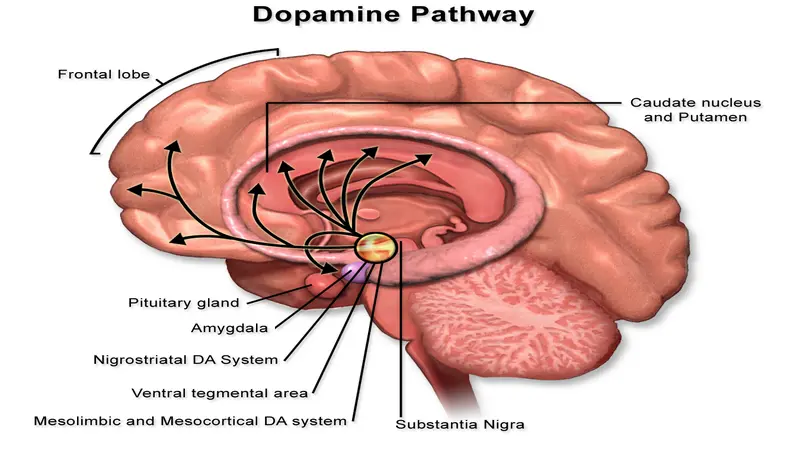
Role of Dopamine as a feel-good factor
However, indulgence in the overlong and frequent sessions of online gaming activity (may be due to passion or just for fun), results in the brain releasing large amounts of dopamine. In order to balance it out, the brain voluntarily shuts down its ability to produce large doses of dopamine for some time.
This actually raises the level of normally accepted dopamine tolerance levels in the body, which is no longer instrumental in bringing happiness and satisfaction to the child. This means that the required bar of dopamine level produced by the brain is now raised. In other words, the person needs a higher level of “dopamine” to experience the same happiness that he used to get earlier, during the time span of his playing online games, due to the dopamine level released by the brain.
Now, expectedly, after the dopamine doses are shut down by the brain, the child or the person no longer feels the same excitement that used to be there. In order to get the same thrill, the online games player starts to play more and more.
But, since the brain has already reached the threshold, it no longer produces dopamine and as a result, the child feels unsatisfied, restless and depressed. The brain has actually developed insensitivity towards releasing dopamine, which used to get triggered by playing online games by the child.
Further, to reach the same happiness level, indulging in more and more online gaming seems to be the only solution. This vicious online gaming cycle continues and if the child does not break away from this, it results in dopamine deficiency in the brain. Thus, the consequences of intense online gaming result in
- Depressed mind
- Shaken confidence
- Trembling hands
- Lost in thoughts
- Loss of appetite
- Indigestion problems
- Restlessness in the hands and legs
- Parkinson’s disease, etc.
Adrenaline: The Fight-or-Flight Hormone
There are small, triangular glands located on top of the kidneys of a person. These are known as Adrenal or Suprarenal glands, which produce different hormones that help to regulate our body’s metabolism, blood pressure, immune system, blood sugar, salt and water balance, etc. These Adrenal glands are composed of two parts, which are the “adrenal medulla” and the “adrenal cortex”.
The Adrenal Medulla
It is the innermost part of the adrenal gland and its main function is to produce the hormones “epinephrine” (or Adrenaline) and “norepinephrine” (or noradrenaline). These hormones are released when the body is under stress.
As most of us may have experienced, in case of a sudden and unexpected incident of danger or when we get scared, we get a panic feeling or anxiety. We either decide to run away from that place or our mind tells us to be there and fight. This is what is known as “fight or flight” syndrome and is triggered by the adrenaline hormones from our adrenal glands.
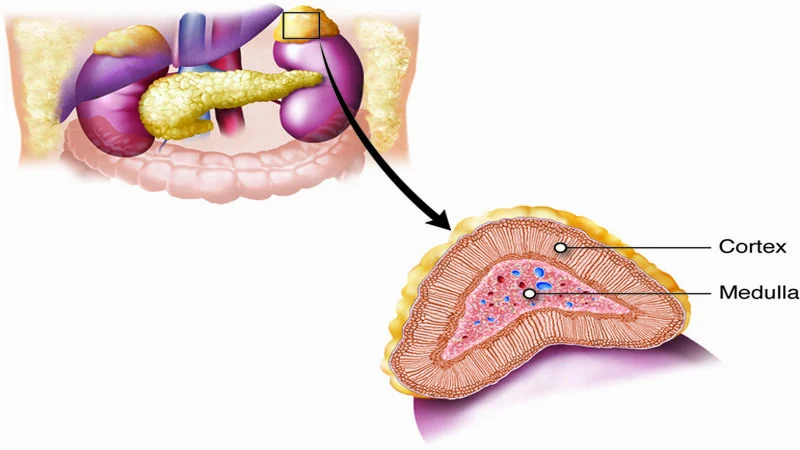
Role of Adrenaline as a ‘fight or flight syndrome’
The online gaming that is intense and fully action-packed is instrumental in triggering this adrenaline hormone in the person playing these games. This is because, at the time of playing these intense, thrilling and fast-paced online games, the mind is fully immersed and involved in the game.
To respond quickly to the perceived danger that these action sequences or the intense moments create, the body naturally reacts by releasing the ‘adrenaline’ hormone as it would do normally in case of any real danger.
The body assumes the danger is real, like a life-and-death question in the case of some extremely violent online gaming. The excess release of adrenaline into the bloodstream results in bad effects on the body, such as:
- The heart pumps the blood harder, increasing our blood pressure, which can cause a stroke.
- The heart rate starts to increase and thus increasing the chance of a heart attack.
- The breathing of the person increases considerably and this increases the anxiety in the person.
- Nervousness and inability to sleep are the result of extreme release of adrenaline.
- The body feels a decreased ability to feel pain or becomes insensitive for some time.
Cortisol: The Stress Hormone
It is the chemical released by the cortex and is the body’s natural alarm mechanism. As already discussed above, these are the triangular-shaped glands located at the top of both the kidneys of a person.
The Adrenal Cortex
The adrenal cortex forms the outermost part of the adrenal gland and its main function is to produce the hormones aldosterone, cortisol and androgen hormones in a balanced amount. These hormones are released to relieve the body of inflammation and help in the better utilization of body fats, proteins and carbohydrates. Also, it helps in balancing the blood sugar and blood pressure levels, besides controlling the wake-sleep cycle of the human being.
Cortisol is released when the body needs an energy boost to manage the perceived emergency situation when the person is under stress. Cortisol is also known as the stress hormone and prepares the body for a dangerous situation.
When the child is playing online games excessively, due to the continuous stress, there are consequences for the body. The balance of the stress management system of the body, which is known as the HPA (Hypothalamic-Pituitary-Adrenal) axis, is disturbed.
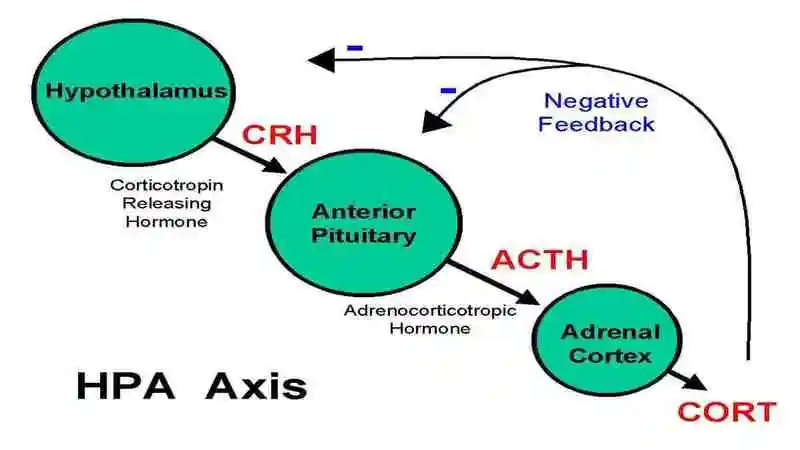
HPA (Hypothalamic-Pituitary-Adrenal), the stress management system of the body
HPA is the main response system of the body and constitutes a link between perceived stress and physiological reactions to this stress. The hypothalamus, which responds to the stress signals from the brain, gets the pituitary gland activated, which in turn signals the adrenal glands to produce more cortisol. Now, the chronology happens this way:
- The hypothalamus produces CRH (corticotropin-releasing hormone)
- CRH, in turn, stimulates and initiates the pituitary gland to secrete ACTH (adrenocorticotropic hormone)
- ACTH hormone further stimulates the adrenal glands to release the Cortisol hormone in the blood.
In a normal situation, the pituitary and the hypothalamus glands combine to control and make sure that the blood has the right balance of cortisol circulating in the body. However, too little or too much cortisol in the body due to extreme stress forces, as a consequence of high adrenaline online gaming, directs them to change the amounts of CRH and ACTH, which is known as a negative loop.
Now, the excess amount of cortisol levels released due to the high-stress factor in the child, due to playing intense, stressful online gaming, has an intense effect on the body. The body has a negative impact, such as:
- The body develops a weakened immune system, which results in other diseases taking over.
- The child getting heart disease becomes a possibility due to high blood pressure.
- The body can develop “Cushing syndrome”, which can cause blood clots, depression, mood changes, type-2 diabetes, weight gain, etc.
- Under high levels of cortisol due to extreme stress, the body may develop digestive problems or irritable bowel syndrome.
Serotonin: The Mood and Gut Manager
Serotonin is a sort of neurotransmitter that acts as a hormone and carries messages from the nerve cells in the brain and to other parts of the body. These chemical messages act as guidelines and tell the body how to function. This hormone is found in many parts of the body, like the digestive system, blood platelets and all over the nervous system.
Serotonin helps the body in many ways, like retention of memory, learning, happiness, sleeping, hunger factor and regulating the body’s temperature. It also relieves the body of anxiety, heals wounds, impacts emotions and controls the motor skills of the body. It acts as the neurotransmitter carrying messages from the brain to other parts of the body.
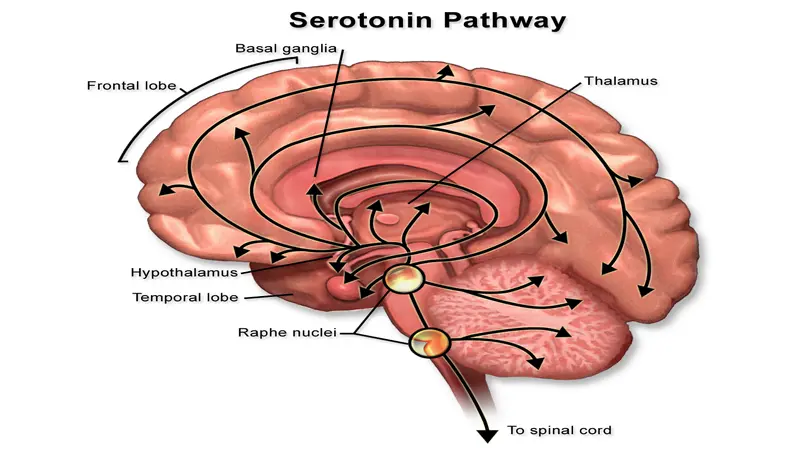
About 90% of the Serotonin is found in the intestines and 10% in the brain.
That is the reason it is responsible for the regular bowel movements of the body. It is released in the blood circulation and thereafter absorbed by the platelets. When the body needs to repair any sort of damage happening to it, the platelets release serotonin and thus help to heal the wounds by stopping bleeding. Serotonin can’t be made in the body and has to be obtained from foods only.
When the child is addicted to extreme online gaming videos, the stress factor is constantly active and growing. This results in the brain’s transmitter Serotonin, stopping functioning correctly. The body bears the consequences of the same, such as:
- The body experiences depression, anxiety and mood swings.
- The child can develop tremors, extreme sweating and nausea due to extreme Serotonin.
- Vomiting, restlessness and headache may be experienced by the child.
- The health suffers due to digestive problems and irregular bowel movements.
- Sleep disorders or Schizophrenia may be experienced by the child.
Some of the FAQ’s about the harmful effects of excessive online gaming:
What mental disorders can result from excessive online gaming?
Extreme online gaming can result in mood swings, depression, and anxiety in children. The kids may develop compulsive gaming behaviors, which, if not controlled, can result in a mental disorder in the child.
How does too much gaming affect a child’s sleep and learning?
By indulging in excessive online gaming, the child will experience a decrease in the quality of sleep and delayed bedtime. This results from the continuous blue rays of the screen, which disrupt the sleep pattern in children.
Can online gaming lead to physical health problems?
Online gaming has its side effects, such as strain injuries like ‘PlayStation thumb’. In addition, the overall obesity problems due to a decrease in outdoor activities are seen, besides other side effects such as eye strain, redness in the eyes and neck pains.
How common is gaming addiction among children?
As per the WHO, 1-3% of the overall population who play games probably meet the criteria of this gaming disorder. However, there are varying statistics with some studies suggesting up to 10% people may be experiencing one problem or the other related to intense online gaming.
What behavioral signs suggest a child is gaming too much?
Various indications suggest excessive gaming among kids. These include resisting parents when being told to stop, decreasing the school grades, frequent mood swings, a decrease in social interactions and work shirking.
How can parents set healthy gaming limits?
There are some limits that the experts agree upon. The permissible limits are 60 minutes during school days and 20 minutes during non-school days. These also include homework priority first and occasional gaming on free days or holidays.
Are online games safe environments for kids?
Not a guarantee at all. The online games may expose the gullible kids to inappropriate content, harsh language, cyber-bullying and unnecessary contact with strangers. Adhering to the safety rules is a must for parents to follow.
Can gaming improve a child’s skills or mental health?
The moderate usage of gaming can certainly improve the skills of the kids under the supervision of their parents. These can improve the social networks, problem-solving skills and gain in confidence.
Why do kids become addicted to these games?
The games have inbuilt mechanisms like rewards and loot boxes, which can trigger the dopamine levels in the child. This is an industry that has been evolving all over the years, where the brain of the child is entangled in the chemical loops and hormones that are produced by the body while playing these games.
When should parents seek professional help?
Decreasing school grades or performance, or shying away from going outside and playing outdoors, are indicators that something is not well with the child’s mental health. The child’s mental expert or a simple pediatrician can be of immense help.

